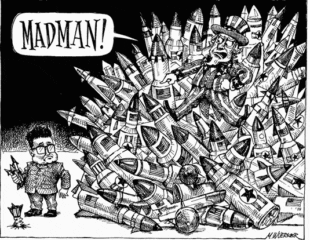 “Over these last few years, given the wars it has waged and the international treaties it has arbitrarily reneged on, the U.S. government perfectly fits its own definition of a rogue state.” — Arundhati Roy
“Over these last few years, given the wars it has waged and the international treaties it has arbitrarily reneged on, the U.S. government perfectly fits its own definition of a rogue state.” — Arundhati Roy
You have the world’s largest military, you’re going to use it, right? Donald Trump and his team, led by National Insecurity Advisor John Bolton, are playing rogue right now with two countries not currently under U.S. control, Iran and Venezuela.
For those who already know that war is not only hell but utterly futile, the raw question hovering over these potential new exercises in mass murder transcends the obvious question: How can they be stopped? The larger question begins with the word “why” and then breaks into a thousand pieces.
Why is war the first — and seemingly the only — resort in so many national disagreements? Why is our trillion-dollar annual military budget sacrosanct? Why do we not learn from history that wars are based on lies? Why does the corporate media always hop aboard the “next” war (whatever it is) with such enthusiasm, with so little skepticism? Why does patriotism seem to require belief in an enemy? Why do we still have nuclear weapons? Why (as journalist Colman McCarthy once asked) are we violent but not illiterate?
Let’s take a look at bad, bad Iran. As CNN recently reported:
“National Security Adviser John Bolton said in a written statement Sunday that the U.S. is not seeking war with Iran, but was deploying the USS Abraham Lincoln Carrier Strike Group as well as a bomber task force to the US Central Command region in the Middle East ‘to send a clear and unmistakable message to the Iranian regime that any attack on United States interests or on those of our allies will be met with unrelenting force.’”
And Secretary of State Mike Pompeo, addressing the issue with disconcerting and unintentional candor, told reporters, according to CNN, “What we’ve been trying to do is to get Iran to behave like a normal nation.”
How would a “normal nation” respond to endless threats and sanctions? Sooner or later it would hit back. Iranian Foreign Minister Javad Zarif, speaking recently in New York, explained it thus: “The plot is to push Iran into taking action. And then use that.”
Use it, in other words, as the excuse to go to war.
And going to war is a political game, a decision made or not made by a few important individuals — Bolton, Pompeo, Trump — while the general public looks on either in support or outrage, but either way as spectators. This phenomenon provokes an enormous, unasked “why?” Why is war a top-down directive rather than a collective, public decision? But I guess the answer to that question is obvious: We couldn’t go to war that wasn’t pre-orchestrated by a small group of powerful individuals. All the public has to do is . . . pretty much, nothing.
Elham Pourtaher, an Iranian going to school in New York state, makes this plea for heightened awareness: “U.S. civil society needs to include more global perspectives on the country’s foreign policy. U.S. citizens must become more aware that their votes have grave consequences beyond their country’s borders. . . . (Their) elected administration’s foreign policy is a matter of life and death for the citizens of the other countries, especially in the Middle East.”
She also notes that “the war has already begun. U.S. sanctions are producing a level of suffering comparable to that of wartime. Sanctions in fact are a war waged by the United States against the Iranian working- and middle-classes. These groups struggle to make ends meet as unemployment dramatically increases even as the inflation rate skyrockets. The same people that the Trump administration is pretending to want to set free are the ones that are hit hardest by current U.S. policies in the Middle East.”
And, oh yeah, the ones gaining empowerment from the U.S. war games are “the most undemocratic factions of the Iranian state.” This is how it always works. Hostile aggression begets hostile aggression. A war on terror begets terror. Why do we not know this yet?
At the very least, the provocations, including the fact that Trump is considering sending troops to the area, have “created a scenario in which everyone is now very worried that some form of an accidental war at a minimum is very likely because you have too many U.S. forces and Iranian forces into too small of an area,” Trita Parsi, founder of the National Iranian American Council, said in a recent interview.
Human society is organized in such a way that war, intentional or accidental, is inevitable on a regular basis. And in the run-up to these wars, only the smallest questions are asked by the media, centering around: Is this one justified? Never, “Is this wise? Is this the best choice?” If something sufficiently provocative is done by the enemy — North Vietnam attacks a U.S. ship in the Tonkin Gulf, Iraq purchases aluminum tubes — then “we have no choice” but to retaliate on a massive scale.
The large questions only come later, such as this cry from a Syrian woman in the wake of allied air strikes on the city of Raqqa, quoted in an Amnesty International report:
“I saw my son die, burnt in the rubble in front of me. I’ve lost everyone who was dear to me. My four children, my husband, my mother, my sister, my whole family. Wasn’t the goal to free the civilians? They were supposed to save us, to save our children.”
— Robert C. Koehler, Peace Voice, War’s Unanswered Questions, May 19. 2019

